Dear Creative Soul,
I’m sitting at my desk, waiting for the timer to go off on my oven. The house is perfumed with baking smells: cinnamon, butter, caramelised apples. Outside a grey fantail performs acrobatics, diving in and out of two overgrown bottlebrush bushes that are at the heart of a bird-and-bee attracting garden bathed in aureate light. Later we will drink strong espresso and bite into buttery-sweet pastries - apple cinnamon scrolls I am baking to use two remaining sheets of puff pastry; now I am relaxing after a morning of catch-up gardening, having returned from a reflective trip to Bali.
A little disclaimer
I have never wanted to visit Bali. There are so many other places in the world I want to visit, and Bali didn’t make my must-see list, despite it being closer to Perth than Sydney and Canberra where my parents live. Australians, who made up almost 25% of visitors to Bali in March 2024, don’t have the best reputation as tourists in Bali, once holding a record for appalling holiday antics (now apparently eclipsed by “nude-influencers, sacred site pants-droppers and Russian tourists behaving badly”. In 1984, Australian folk band Redgum released a critique of the classic but often toxic Australian holiday, “I’ve Been to Bali too” (1984). What seems like a jaunty holiday anthem on the surface, has a deeper, more pointed message about consumer consumption habits that still resonates with me thirty years later.
But my sister has lived in Bali for eight years - five in Ubud, and now three in Nusa Lembongan - and she has always been the one to visit when a visa run was necessary. After not seeing her for four-and-a-half years (three of which were due to the pandemic), it was our turn. And so off we went to Nusa Lembongan for five days, taking a boatload of questions with us.
Would we love it? Would we want to come back? Would our experience affirm our assumptions of an overly touristed island? What would we learn about ourselves? About the place?
This is not an Instagram gallery
Nusa Lembongan is beautiful and, in some parts, idyllic. Crystal clear water with a distinctive turquoise hue (created by sunlight hitting minuscule limestone crystals that are mixed into the water). A laidback island village vibe. Wild, untamed ocean tides at Devil’s Tear. Fiery sunsets and tropical heat, the kind that leaves your skin never feeling quite dry.
But this letter is not about how beautiful Nusa Lembongan is (although I’ve shared a few snapshots here). Any of these photos could have been taken thousands of times before by thousands of other travellers - they are stunning, but have little new to add.
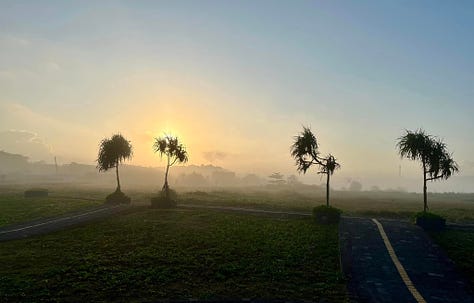
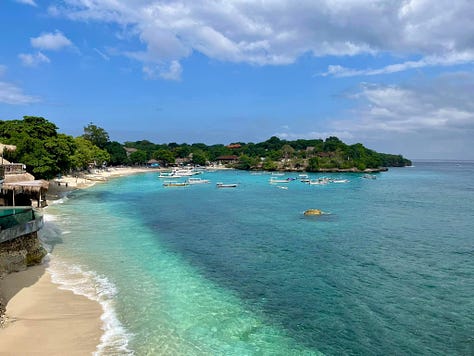
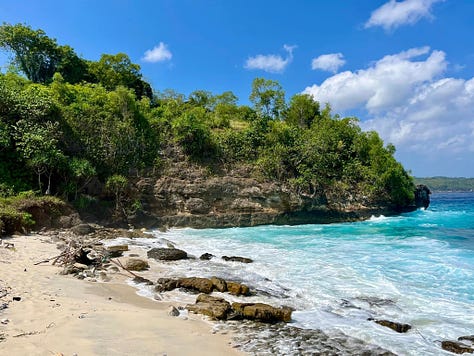
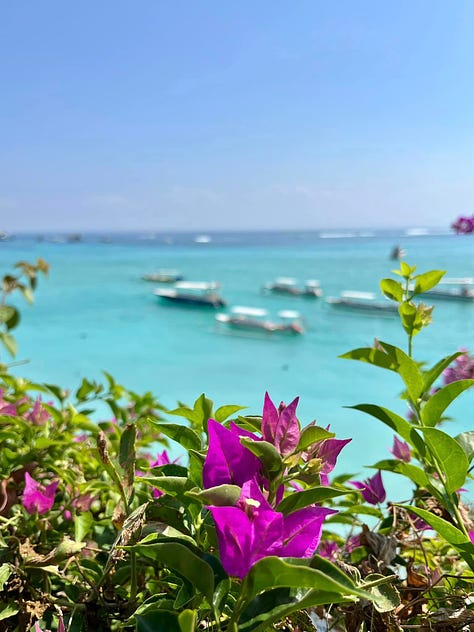
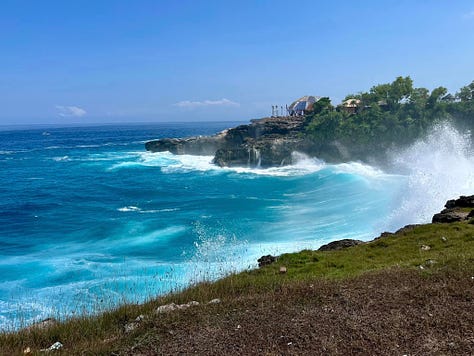
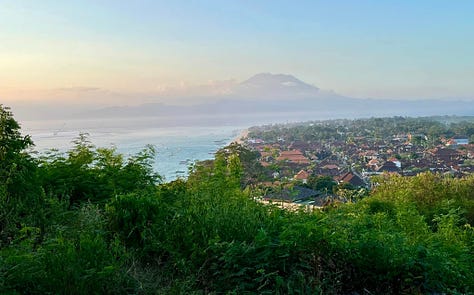
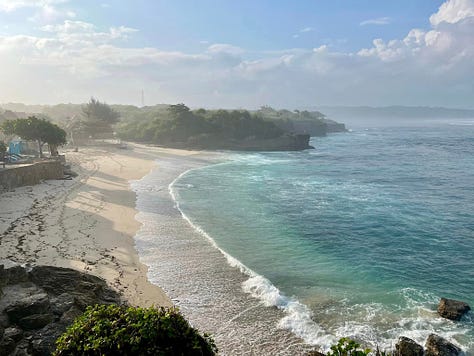
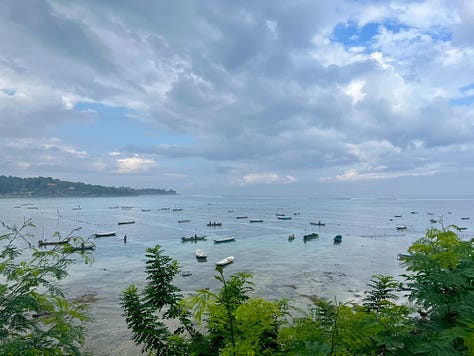
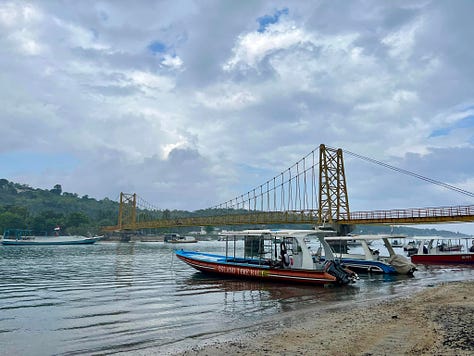
Although our main reason for travelling to Nusa Lembongan was to reunite with my sister, we also wanted to get away from the stresses of our daily lives. To unwind and forget the hustle and bustle of routine.
To see something new.
In Sanur, waiting for the ferry, I wrote my first impressions of Bali:
Humidity, wet slap against the skin. Sweat dripping, regrettable choice of t-shirt. Chaotic traffic, scooters weaving in and out of trucks, no rules. Uneven pavements, gaping holes only partially covered by planks of wood. Imagine: a tourist, head down looking at phone, breaking a leg (or worse). Scent of frangipani, yellow, white and deep pink flowers. Crushed frangipanis underfoot. Daily offerings of gratitude placed on the ground, on shrines - small woven bamboo baskets holding a vibrant array of items: rice, flowers, incense, sweets, fruits, spices, food. People calling: "Buy, buy, buy", "Taxi?", "Ferry", "Come see my shop". Overwhelming. Fascinating. In your face.
What have we done?That wide-eyed “what have we done?” question was forgotten once I saw my sister waiting on the beach, arms open, tears flowing. Over our five days, we hired a scooter and followed her around her island home, visiting beaches and scenic lookouts, riding through villages and past temples; we swam and walked and talked, we ate in cheap and cheerful warungs and trendy mid-range cafés. We didn’t shop at all.
But …
One thing you can’t miss, no matter how stunning the backdrop, is the rubbish. You can look away, and after a while, you can’t help but zone it out. But what a reminder of what we do, the mess we make. It’s everywhere, in ugly, discordant piles: plastic water bottles, glass Bintang bottles, bags of rubbish. You’re at a lookout and next to you, there are dozens of empty bottles. You’re walking through a jungly patch and there are hills of rubbish bags and bottles. The innovative and commendable community recycling centre and permaculture garden aims to increase education and decrease poverty, but it appears that the levels of rubbish outstrip capacity. It will take time. Education. Support.
Then there’s the smog that often shrouds the island, smog from burning trash, plastics and all, raising air pollution levels to toxic levels. As I write, “the current PM2.5 concentration in Bali is 7.1 times above the recommended limit given by the WHO 24 hrs air quality guidelines value.” In the early morning, it could be mistaken for fog. It’s not.
And the poverty. The island paradise tourists see on the surface belies the stark poverty, especially in the more rural areas. But if you go off the main routes and through the small villages, you can’t ignore the squalor. The makeshift, falling down houses, the children who aren’t at school, the people whose eyes track you as you ride past.
The lack.
The guilt.
“…in the boom years before Covid, Bali’s extensive rural poverty revealed the continuing economic disparity. The bulk of rural Balinese did not participate in Bali’s economic boom. Even with tourist dollars prime-pumping Bali, the rural poor were left poor. Bali’s growth in the go-go years never got far beyond the urban areas.”
It’s sobering when you’re confronted with undeniable, unavoidable evidence that you are well and truly on the lucky side of the widening gap between those who have and those who don’t. When you see firsthand the societal problems resulting from poor infrastructure and plastic pollution.
It comes as no surprise that, according to the Bali Children Foundation, during and after the pandemic “the situation in rural areas went from bad to worse”. Those who supported their families through hospitality work lost jobs or had wages severely reduced, which trickles down, down, down. I spoke with a young woman who is supporting her son and family by working as a masseuse and beauty therapist, charging prices seventy to eighty per cent cheaper than I would have paid at home.
Seeing this side made me feel uncomfortable, a mixture of guilt and embarrassment that lingers even as I write. Yes, tourist dollars help, but over-tourism creates more problems. I’m still processing this uneasy juxtaposition of happiness coming from my privilege and sadness.
People watching
One morning, we stood by the side of the road overlooking the Ceningan Strait and watched the seaweed farmers at work. Beaches are lovely, but this is life. This is story. Seeing stories like this unfolding is one of the things I love most about travel.
These farms had all but disappeared once the tourism boom reached these islands, but sprung up once more when the pandemic throttled tourism. Locals, unable to get more lucrative work in hospitality, went back to nature, reviving old ways, scratching a living in an unpredictable environment.
Whole families and communities work together - in the photos below, even the children are gathering scraps (when they weren’t distracted by a scantily-dressed influencer prancing about in front of a ring light).
As tourism continues to gather pace and Lembongan’s star rises, I hope the old ways are not lost, that a balance is found.
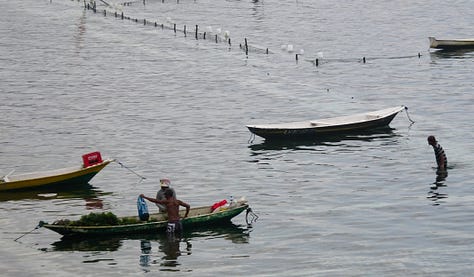
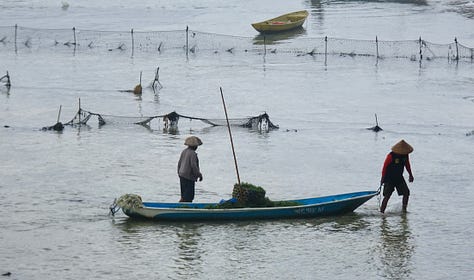
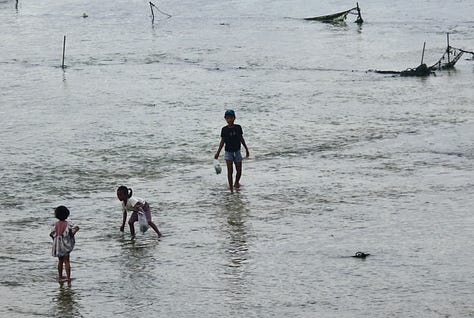
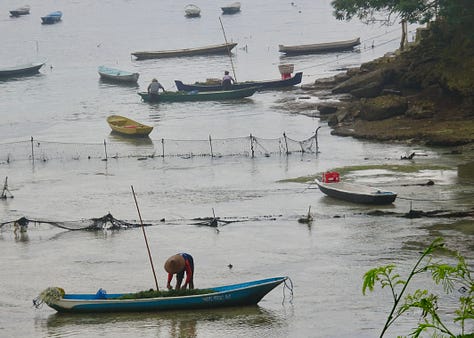
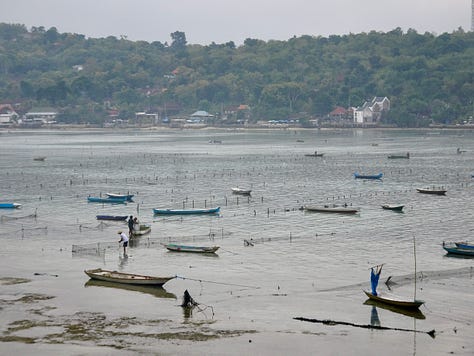
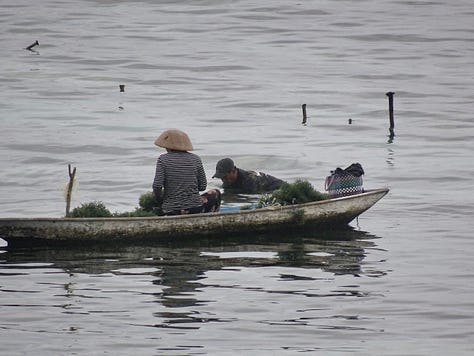
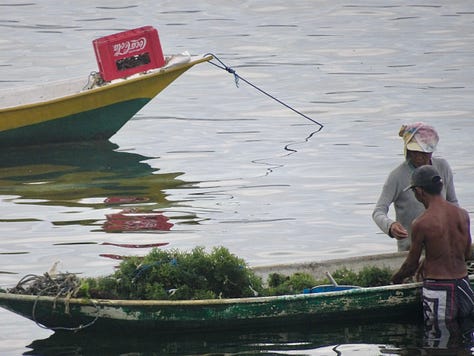
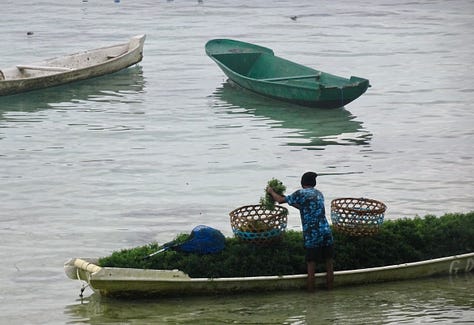
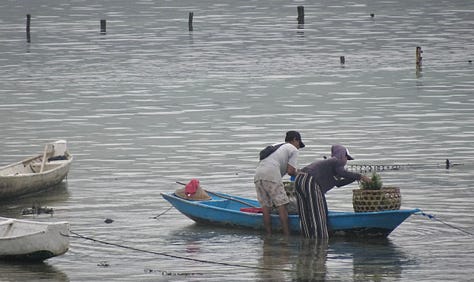
Final thoughts
Last night, I read
’s thoughtful letter about our oftentimes tendency to view the world “through a filter of desire, an eye for how it can serve my needs.“I see my environment as a commodity for my consumption, as a stage on which to realize my potential. As a place that exists for me.”
- Shy Guy Meets the Buddha
When we travel, it’s so easy to look through these covetous eyes. While in Lembongan, I admit to imagining a house on the beach, wanting that view … even if only briefly. (I am not a lover of tropical climates so it would never work, anyway.) But for the most part, while I was in Lembongan, I chose to enjoy the moments and, instead of buying souvenirs I don’t need, I brought home memories and reflections and stories. And the reminder that I already have so much, more than I need.
Smoke haze shrouds the island, casting a grainy filter over the beach, the sky, the sand. Waves pummel rocks, sending clouds of white mist skyward. Turtleneck doves sift through the daily offerings, scattering petals without a care. "How are you?" - the question is asked everywhere by locals, but the smile on their faces when you stop, make eye contact and say "How are you?" back is worth gold and so is the sunrise, the way the fields are bathed in the most golden of sleepy golds before the sky pinks and blues and wakes. The caress of wind as you ride up and down, around and around. The pooling and dripping of sweat when you are still, trickling like a tear down your face, your back. The smells of frangipani and fish and brine and salt and coconut and chickens and spices and life. The first sweet sip of a young coconut; the surprise of a ginger tea. Fish, blackened and spiced, eaten as the sun sets over a long, flat beach. The temple calls and rhythm of drums. A child with big brown eyes, asking if you want to buy a bracelet.
Life after life after life. To read Don’s post, click below:
La Muse: Pausing to Wonder is a gift of words and will continue to be free for all readers for the foreseeable future. However, if you feel led (and able) to support my writing financially, there are a couple of options: 1) Buy Me a Coffee, which is a one-time “tip” as a way to say thank you, or 2) subscribe at one of my paid tiers if you wish to provide ongoing support. You can also recommend my Substack to other readers.
Either way, I am grateful that you have chosen to be here today, to be part of my community of readers and writers pausing to wonder (and wander). Let's keep connecting as a community and building each other up.




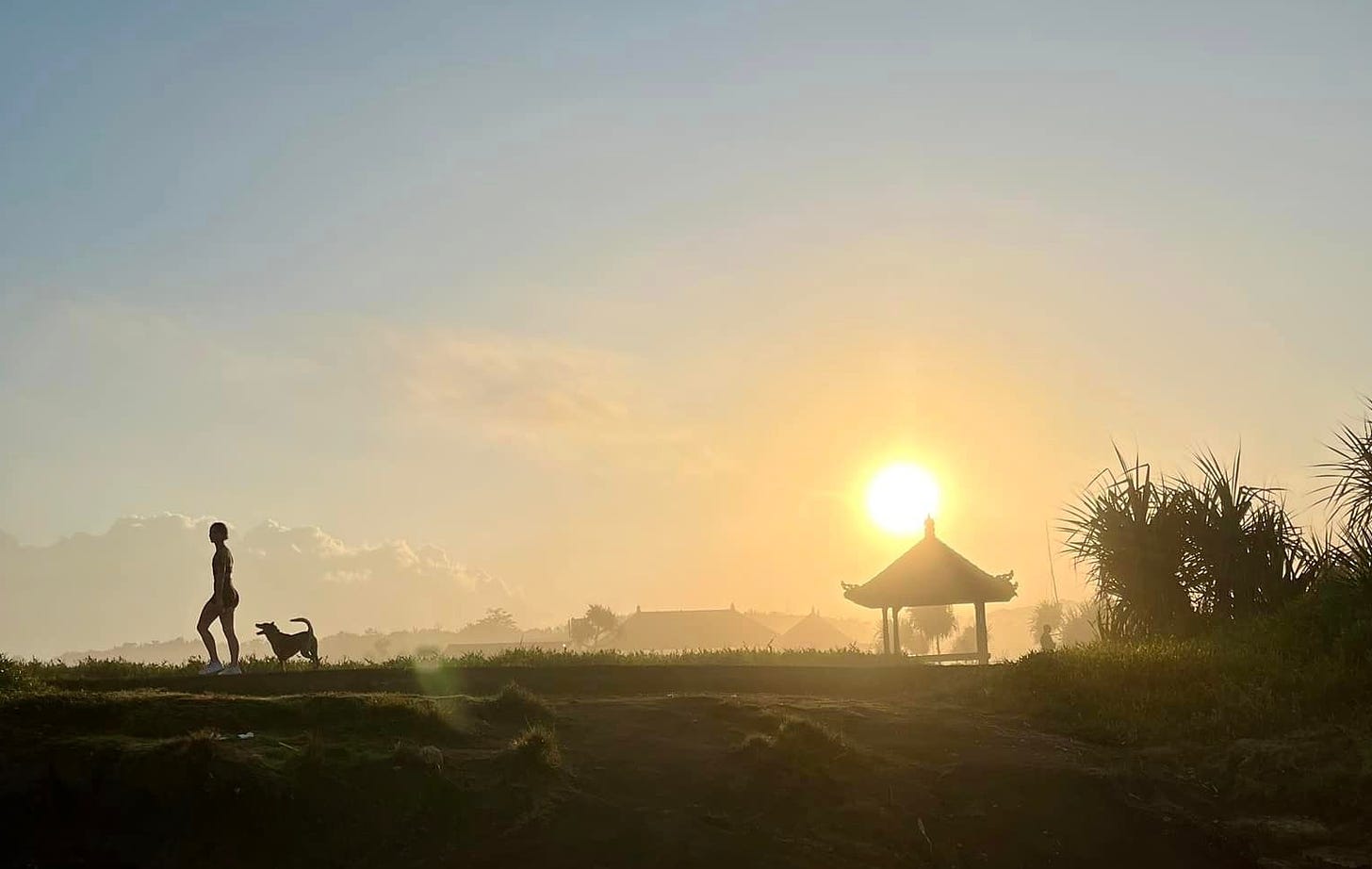
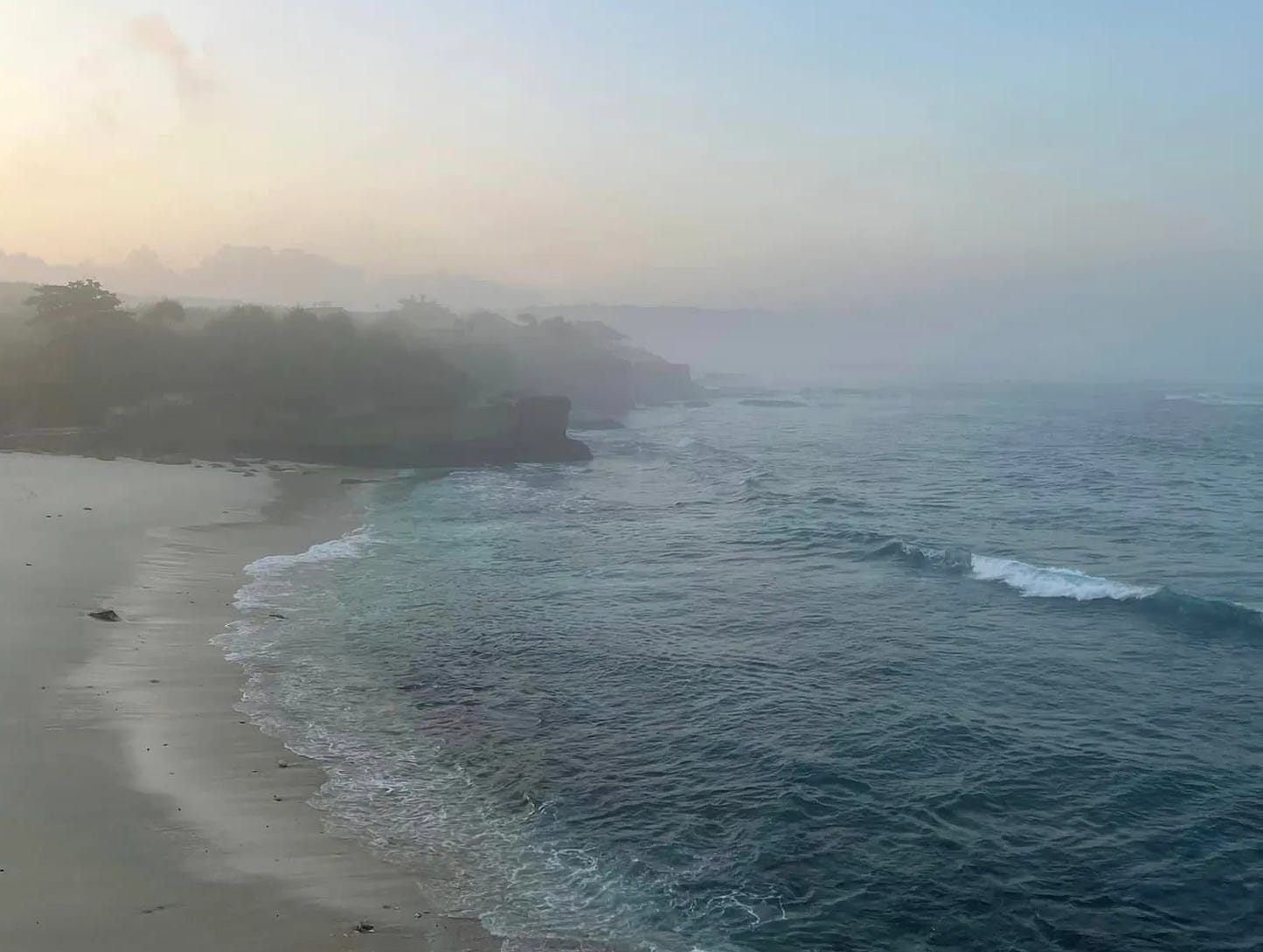

I’ve never been to Bali, and have no inclination to do so. I have heard the countryside is stunning (away from the garish lights and noise of the hotels etc) but it’s that pitiful poverty that puts me right off. Compared to some people we’re average, but next to these dear souls on a subsistence level we are kings. And I’m not sure I could deal with that.
Thank you for this beautiful piece.
You have a gorgeous way with words 💕
Monique, thank you so much for mentioning my essay in your wonderful travel post. You did a great job of describing your inner experience while traveling through a land whose facade is beautiful, but whose people live real lives of struggle. Keep up the great work 🙏💚